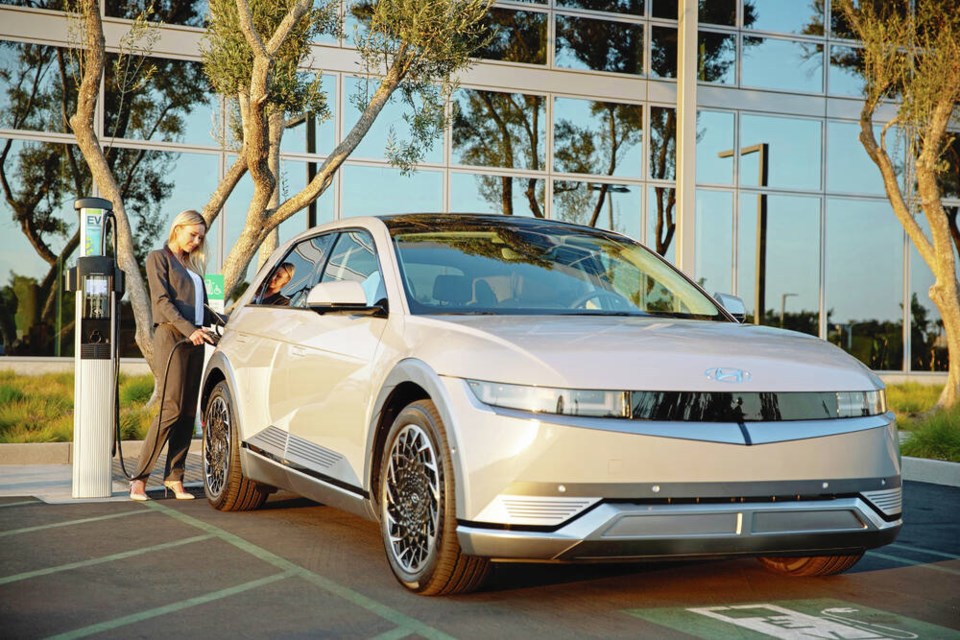A Vancouver electric-car owner was shocked to learn earlier this fall that seemingly minor damage to his car’s battery required replacement of the unit and was quoted a $60,000 repair bill — more than the list price for a new car.
The owner was told the damage voided his warranty on the 2022 Hyundai Ioniq 5, forcing him to file a claim with ICBC, which simply wrote the car off due to the extraordinary cost.
Automotive journalists Zack and Andrea Spencer chronicled the case on their Motormouth YouTube channel and said the case raises big questions for EV manufacturers around replacement costs and repairability of batteries as Ottawa introduces new rules to speed up EV adoption.
“The story is, people are buying these cars not knowing what the actual cost of the most important component of the car is to replace,” Zack Spencer said.
In this case, the Ioniq 5’s battery cover plate on the bottom of the car was scratched and showed a small deformation, which indicated the battery had suffered an impact.
Andrea Spencer added that it poses a problem for the whole industry if manufacturers can’t bring battery costs down, because “we cannot be writing off electric vehicles because the battery is damaged and the price is much too high to repair the vehicle.”
“This is a wakeup call and it really is big news,” Andrea said.
How big an issue writing off damaged EVs over battery-replacement costs in B.C. is difficult to determine because ICBC, the provincial insurer, doesn’t track that information, said spokesman Greg Harper.
B.C. has one of the highest EV adoption rates in Canada, but the 81,415 light-duty vehicles on the road at the end of 2022 were still just three per cent of the province’s personal-vehicle fleet, according to ICBC.
Staff in the insurer’s claims operations report that “it is an extremely rare occurrence” for vehicles to be written off solely for damage to a battery, Harper said.
However, when the repair cost of damage to a vehicle exceeds its cash value, ICBC will deem the vehicle to be a total loss.
Data is also difficult to come by in larger U.S. markets, but insurers are taking note of an increasing trend toward writing off low-mileage zero emission vehicles with minor damage, according to reporting by the news agency Reuters.
Reporters found that some manufacturers, such as Ford and GM, said they were making their battery packs easier to repair. However, in many cases, technicians lack the diagnostic data they need to evaluate even minor damage, so vehicles still have to be written off.
“The battery pack alone is often 30 per cent or more of the actual vehicle cost still,” said Werner Antweiler, a professor in the Sauder School of Business at the University of B.C. who studies renewable energy. “So this is a very significant thing.”
Antweiler said manufacturers are trying to balance trade-offs of making batteries that are light enough to be practical without also making them too expensive.
Many manufacturers place batteries at the bottom of their vehicles to give cars a better centre of balance, but that makes them more vulnerable to bumps or scrapes against obstacles in the road, Antweiler said.
That means they need to protect batteries better or make battery packs with more modular components so damage to one part doesn’t affect the whole unit, Antweiler added.
“So that is a question about the design,” Antweiler said. “And the manufacturers are still learning this is really a problem that needs to be solved.”
One of the difficulties for repair technicians is that auto manufacturers are so busy building cars to put them on the road they aren’t making a lot of replacement parts available, but the service sector is trying to catch up, said Mubasher Faruki, associate dean of automotive programs at the B.C. Institute of Technology’s school of transportation.
Faruki added that another big part of the problem is that there are few subject-matter experts to diagnose whether damage to batteries can be repaired and no standards or regulations to determine whether repaired batteries can be put back on the road.
However, aftermarket parts manufacturers are starting to get in the game of producing replacement parts, such as battery contacts, bus bars and fuses, so repairs can become more possible, Faruki said.
At BCIT, he said experts are using that availability of parts to do their own research and development on what kind of battery damage can be safely repaired.
They’re also working with the Canadian Standards Association to develop standards around battery repair and certifying technicians, which will help bring the cost of EV repairs down.
“We’re literally building the plane as we fly so these things can actually start becoming mainstream,” Faruki said.
For the auto-journalist Spencers, the case they’re investigating leaves them with a lot more questions to ask as they evaluate EVs on behalf of consumers, such as whether batteries can be repaired, what do their warranties cover and what the cost is to replace batteries?
“If you are interested in buying an electric vehicle, you’ve got to have an EV checklist when you go into the dealership,” Andrea said.



